Is The Stand Following New York's Health Guidelines?
The club's co-owner said an indoor podcast recording for a small audience "wasn't live entertainment."
Two weeks ago New York City reopened restaurants for indoor dining, extending a needed lifeline to some comedy clubs struggling under pandemic-related closures. While the state’s relaxed health guidance allows for service at limited capacity, it continues to prohibit most forms of live entertainment inside (or outside) restaurants. This did not deter one Manhattan comedy club from hosting indoor comedy with a live audience earlier this week.
The Skanks are LIVE tonight at 8:00pm EST with @TheCumiaShow & @aaronbergcomedy joining @luisjgomez & @ComicDaveSmith from inside @TheStandNYC! If you can’t make it in person, you can watch LIVE for FREE at https://t.co/IV6k3WZTNl! #LoS pic.twitter.com/0xZgzLEqA0
— Legion of Skanks (@LegionOfSkanks) October 12, 2020
On Monday, The Stand, a comedy club and restaurant in Union Square, hosted a live recording of the podcast Legion of Skanks. The recording occurred indoors with a small audience of 24 invited guests, according to a Tuesday evening Twitter post by the club, which can hold 75 patrons at 25% capacity. (The Stand would not answer any questions for this article, and posted that statement after I sent co-owner Cris Italia a final request for comment.) Audience members were given temperature checks at the door, the post continued, and “anyone not wearing a mask at their table was eating food.” Under current guidance for indoor dining, restaurant employees are advised to encourage patrons to wear masks at their tables when not actively eating or drinking, but cannot require them to do so. On the podcast’s live stream, seated patrons were visible unmasked for stretches while neither eating nor drinking. None of the comedians wore a mask.
The recording featured hosts Luis J. Gomez and Dave Smith, and guests Anthony Cumia and Aaron Berg. Cumia is the owner of the digital network Compound Media and host of The Anthony Cumia Show with Dave Landau, a talk program that frequently hosts guests like Ann Coulter and Gavin McInnes. (McInnes, who founded the Proud Boys, hosted his own show on the network until 2017.) In 2014 Cumia was fired from his longtime gig hosting SiriusXM’s Opie and Anthony after a racist Twitter rant, and in 2016 he pleaded guilty in a domestic abuse case involving his ex-girlfriend. Berg is the co-host of Compound Media’s In Hot Water, a highly provocative morning show with recurring segments like “Rape of the Day” and “Black Guy of the Day.” Both guests have a history of derisive statements about Covid-19 safety measures, and both have used the virus to express their views on China:
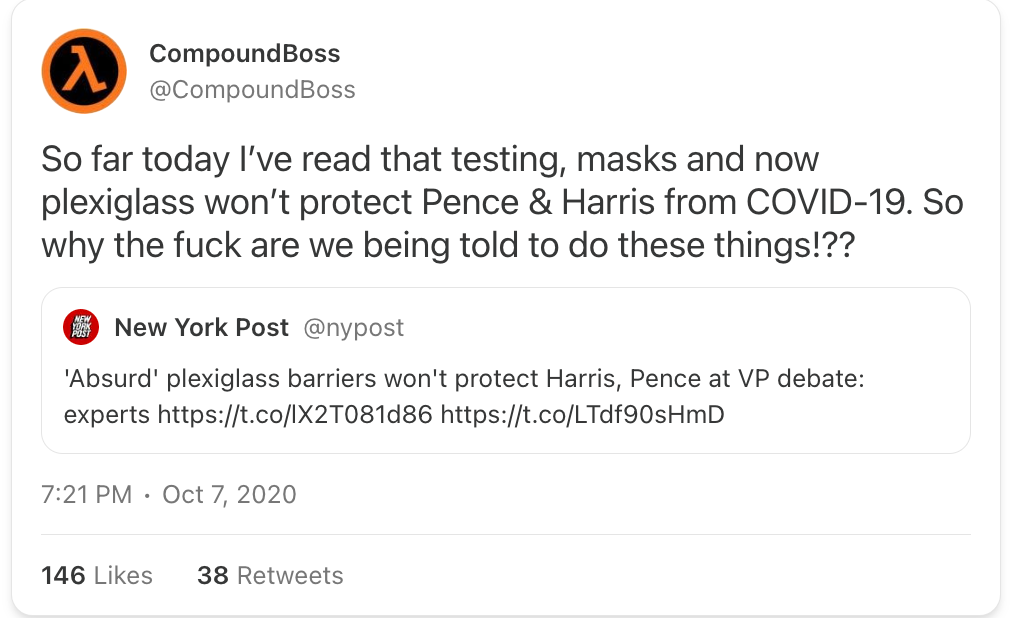
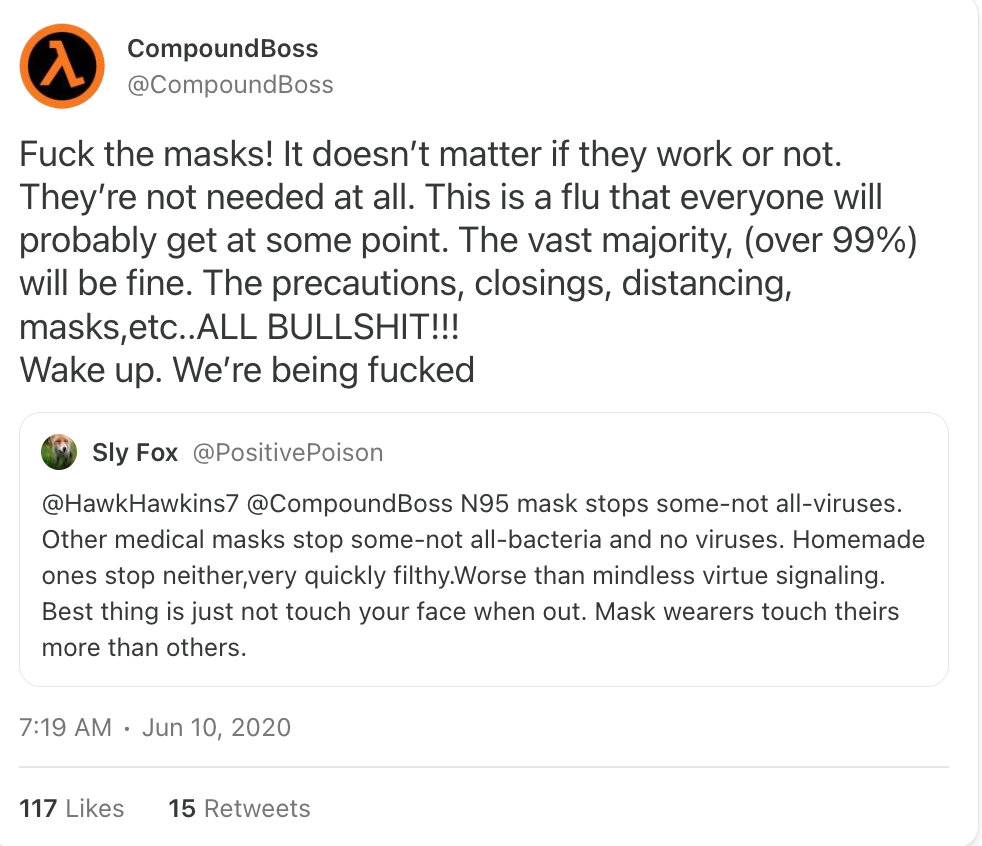
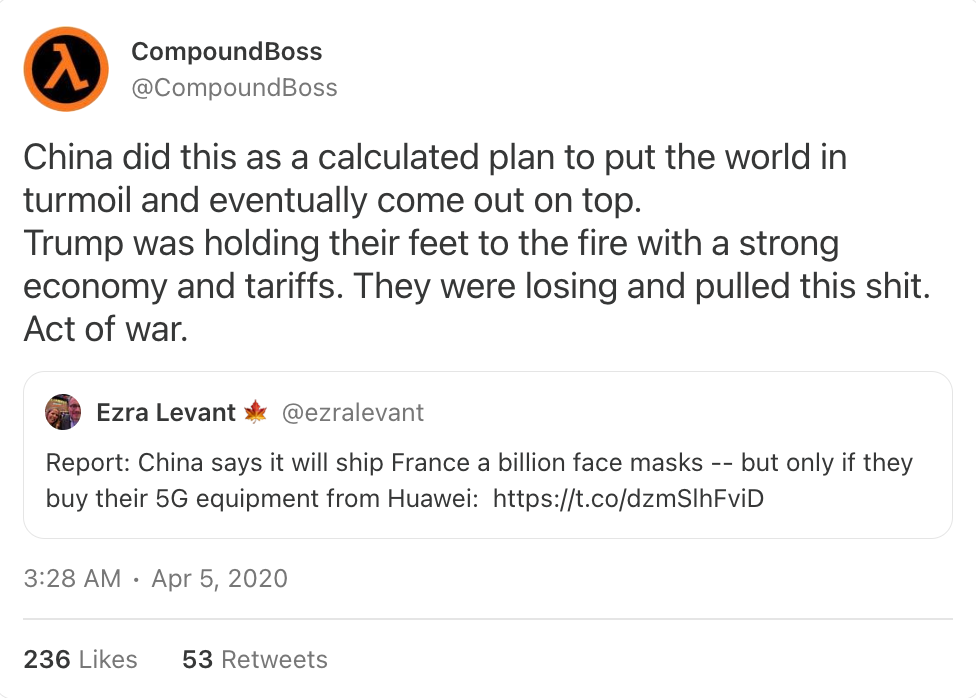
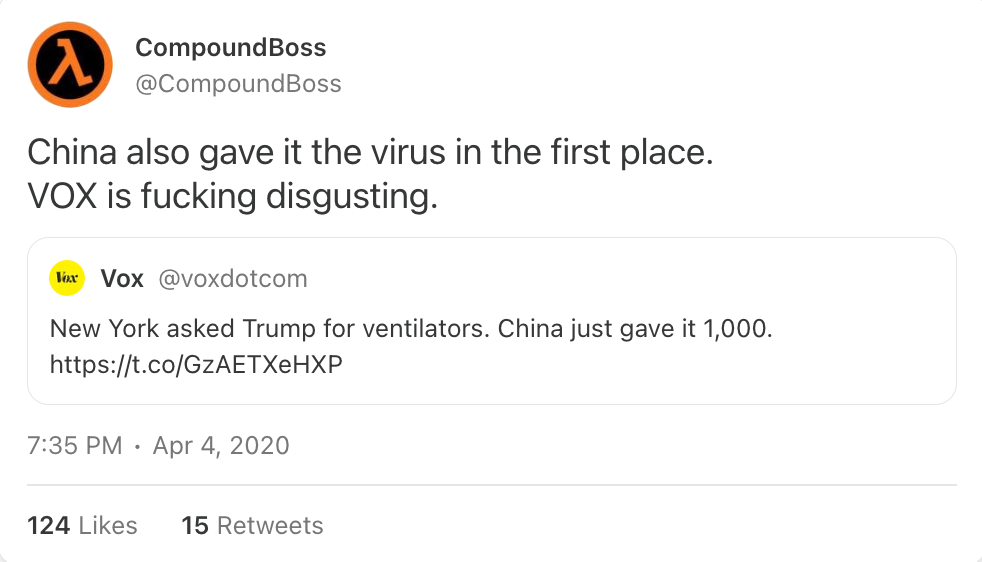
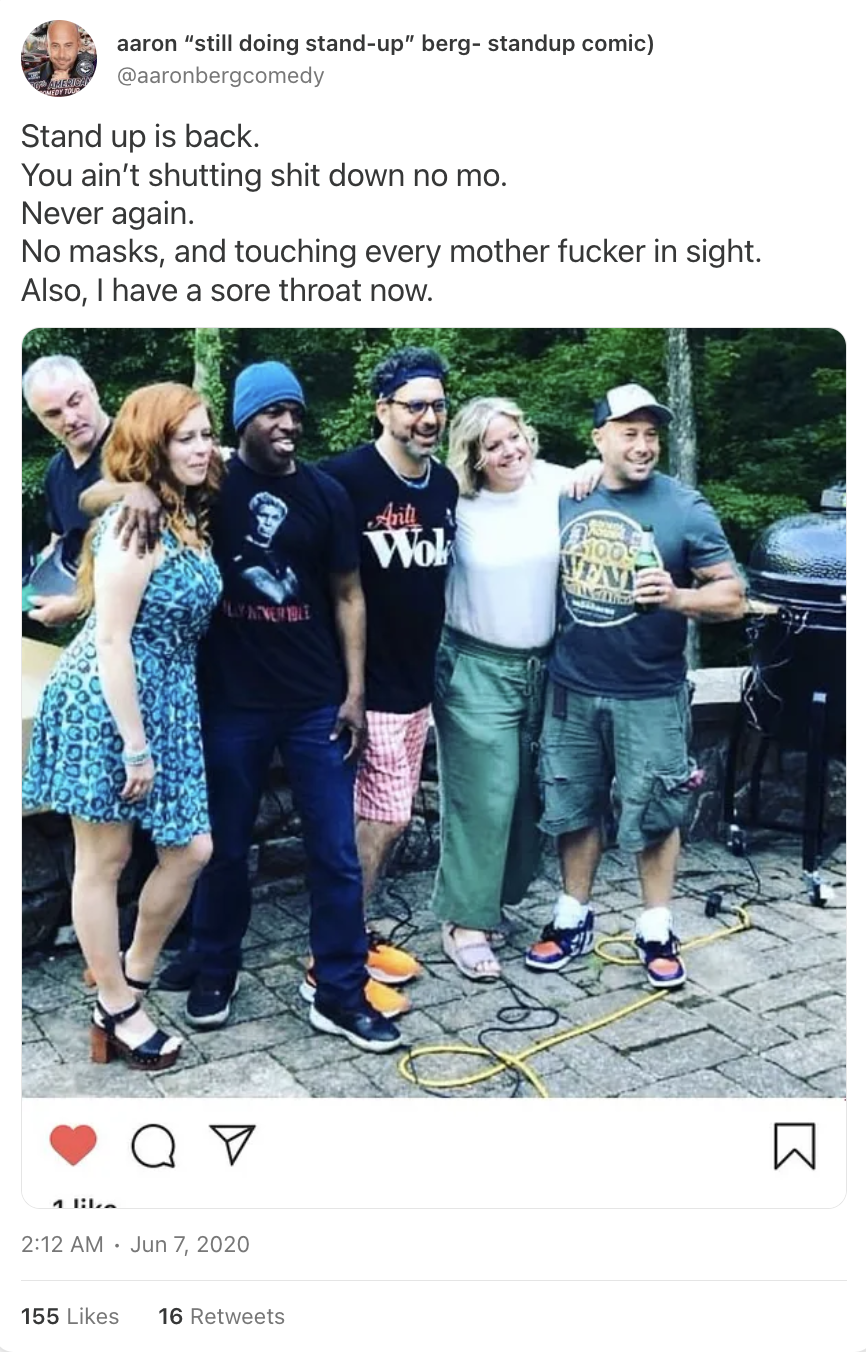
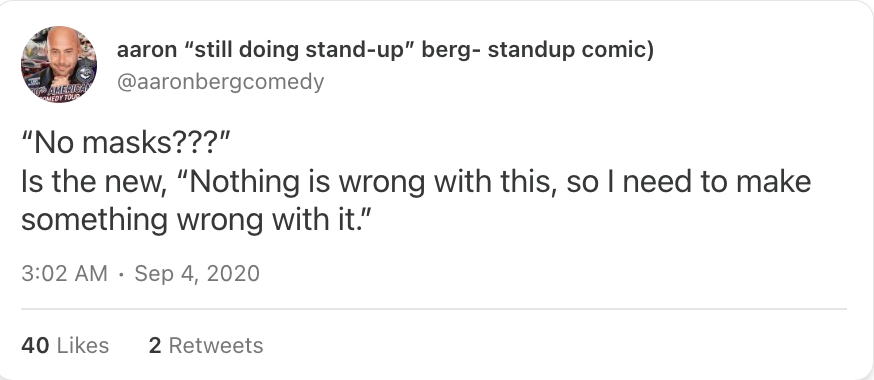
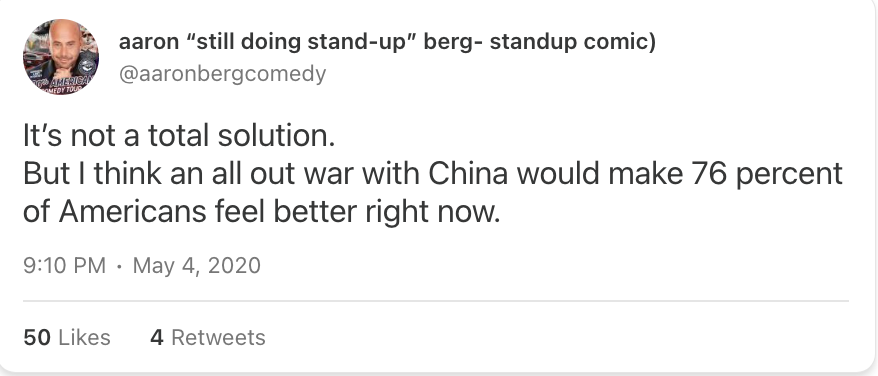
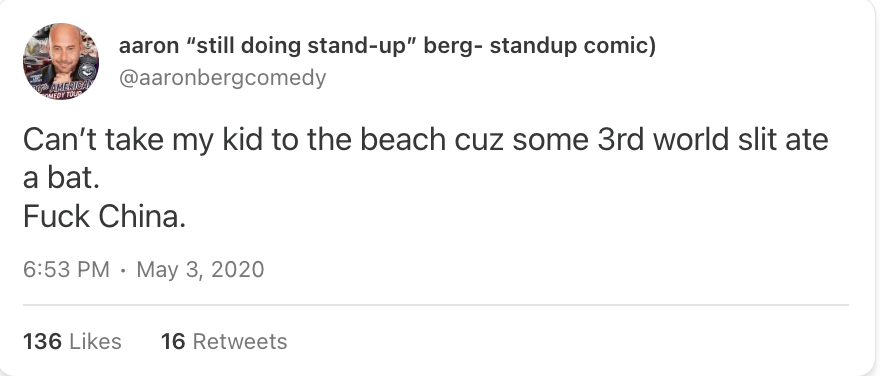
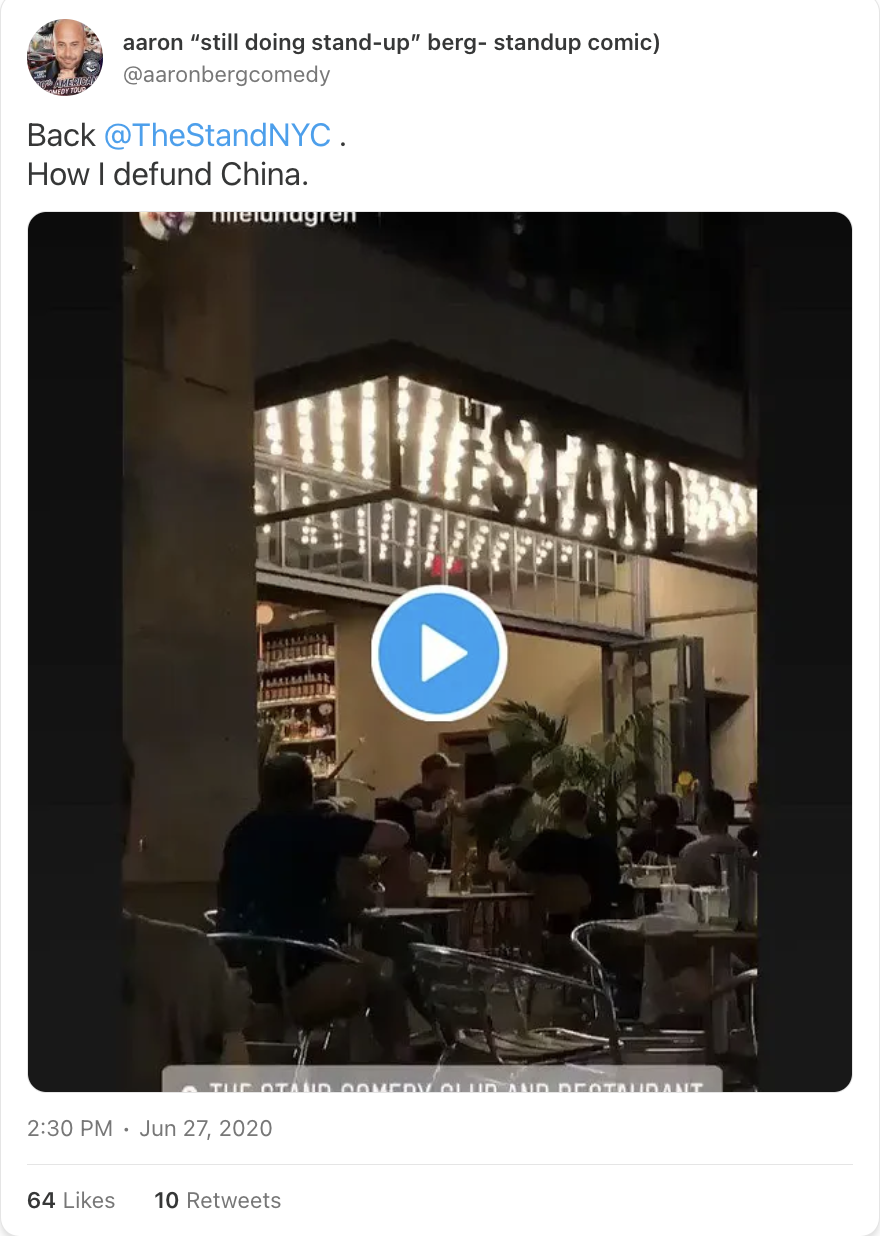
Early in the two-hour-long stream, Berg remarked that it was a pleasure to be back indoors doing comedy. “I’m very happy that we’ve succeeded at being indoors, socially distanced and safe,” he said later. At one point the group suggested that former New Jersey Governor Chris Christie’s release from the hospital was a sign that Covid is over: “Open everything,” Cumia said. At another, they questioned whether laughter poses a significant enough risk of transmission to merit club shutdowns. “Is that what’s going on? I couldn’t wrap my head around it,” said Gomez, who recalled “openly mocking Covid” in January and February comedy sets by coughing on audience members. “It’s just the reasonable government rules,” riffed Smith, who hosts Part of the Problem, a podcast about libertarianism. “They’re just like, ‘Guys, we’re gonna need you to not laugh for a year.’”
The live recording, which was advertised on several social media accounts, may have run afoul of New York health guidelines. Live comedy shows are currently not permitted; when I asked the Health Department for any guidance concerning indoor podcast recordings, spokesperson Jonah Bruno copied the guidance for live entertainment:
Q: Can I have live entertainment or a DJ in my indoor or outdoor dining area?
A: Restaurants and other on premises food and beverage establishments that have a license through the SLA are only allowed to offer on-premise music if their license certificate specifically allows for such activity (i.e., live music, DJ, recorded, etc.). A manufacturer that has an on premises license also must assure that its on premises license certificate specifically allows for the type of music it is offering. A manufacturer without a separate on premises license may offer music unless its license certificate specifically prohibits such music.
If offering music, indoors or out, all relevant aspects of the respective Department of Health guidance dining must be followed, e.g., patrons should not be standing except for necessary reasons (e.g., restroom, entering/exiting), standing patrons should wear face coverings, etc. Performers should be at least 12 feet from patrons.
All other forms of live entertainment, such as exotic dancing, comedy shows, karaoke etc., are not permissible currently regardless of phase.
Additionally, please note that only incidental music is permissible at this time. This means that advertised and/or ticketed shows are not permissible. Music should be incidental to the dining experience and not the draw itself.
Bruno highlighted the line: “All other forms of live entertainment, such as exotic dancing, comedy shows, karaoke etc., are not permissible currently regardless of phase.”
We are LIVE tonight at 8pm est. from @TheStandNYC! If you want to be in the audience, use this link, to make a reservation! Seating is VERY limited so don't sleep on it. Come hang with The Skanks! https://t.co/FS2QSKmgXR
— Legion of Skanks (@LegionOfSkanks) August 31, 2020
The Stand has been hosting live outdoor Legion of Skanks recordings since the summer. Last month it joined a group of New York comedy venues lobbying the state government to let them resume indoor and outdoor performances. In a proposal sent to Governor Andrew Cuomo, the venues argued that reopening comedy would mitigate the public health risk posed by rule-defying underground shows:
While licensed venues have since been re-shuttered, public gatherings of <50 and private parties are still allowed. This is how speakeasy culture starts. New Yorkers are already seeking out spaces to skirt the rules and create their own private events outside the purview of government. This endangers public health in the precise ways the SLA and Department of Health (DOH) are attempting to eradicate.
The clubs said later in the proposal that if allowed to reopen, they would adhere to the state’s guidelines for indoor and outdoor entertainment. Those guidelines require venues to ensure that "all individuals, including employees and patrons/visitors, wear face coverings any time they're within 6 ft. of another person." It’s not clear whether the Stand feels the recording fell under that guidance or the dining guidance, which is less strict about masking. When I reached out to co-owner Cris Italia for comment, he responded, “Here's a comment: Stop pretending to be a reporter.”
One expert consulted by Humorism expressed concern that The Stand’s shift to indoor comedy would bring a new level of risk for the club’s employees, comics, and patrons. "Outdoors is so, so, so, so key. Being indoors is perhaps the largest risk factor for super spreading events," said Dr. Lindsey Leininger, a public health educator at Dartmouth’s Tusk School of Business. She described a framework that she and her colleagues use to assess the risk levels of various situations, “SMART”: Space, Masks, Airflow, Restrict your bubble, and Time. "You don't want to be sharing air indoors for long periods of time with people laughing and talking. I mean, that truly is just a condition that the virus absolutely loves," she said.
The risks of indoor entertainment are not limited to those performing and watching. The Atlantic noted earlier this week that people may be “20 times” more likely to catch the coronavirus indoors than outdoors, and that indoor gatherings have been responsible for outbreaks across the country, with one North Carolina family affair resulting in 40 cases. "I think of all the folks who are potentially sharing an exposure here," Leininger said of the podcast recording. “There's 25 people who live in different households, there's the comics themselves, there's the servers at the restaurant, the back of the house staff at the restaurant, many of whom commute out to multigenerational households and far-flung parts of the outer boroughs. I'm just seeing a wide web of people sharing the exposure that's happening here. If one spark, if one infected person happened to be at this event, it would have a pretty serious ripple effect in terms of potential super spread.”
Leininger expressed caution about the efficacy of temperature checks upon entry. "It's a very imperfect screening measure," she said. "Unfortunately, there are no protocol shortcuts that can allow for risky activity. You cannot protocol your way out of a high-risk context. We saw that in our faces at the White House.” She stressed the importance of comedy in dark times, lamenting that venues have been forced to prioritize their immediate survival over the long-term benefits of staying closed. "We need laughter and humor and comedy more desperately now than ever,” she said. “The fact that there's not an appropriate social safety net that's better incentivizing comics and restaurant workers and others to not have to risk their lives—or say that they need to do so to protect their livelihood—is a real failure of our society. But that's no excuse for putting people at risk.”
In tweets to me and other users, Cris Italia said Monday’s recording “wasn’t live entertainment” but a “private event” held after the restaurant closed in accordance with “all the guidelines,” and that “A venue is allowed to rent out its space for whatever reason.” I could not locate any guidance permitting the rental of venues “for whatever reason,” and inquired with the Health Department for input. I will update this post if it responds.


